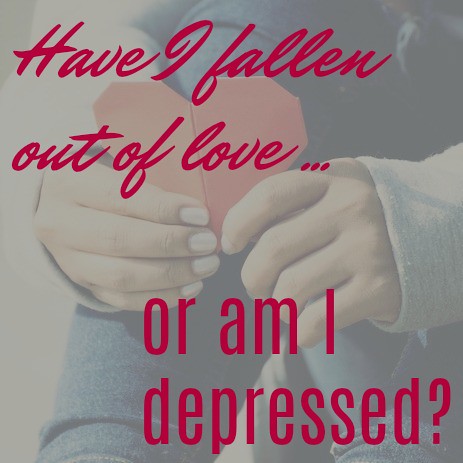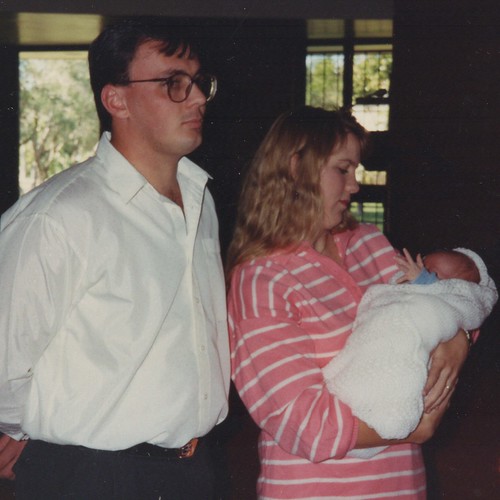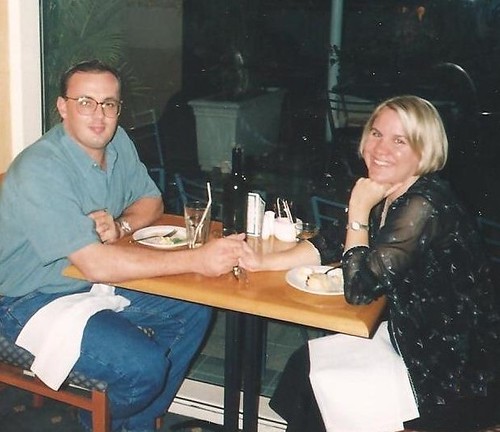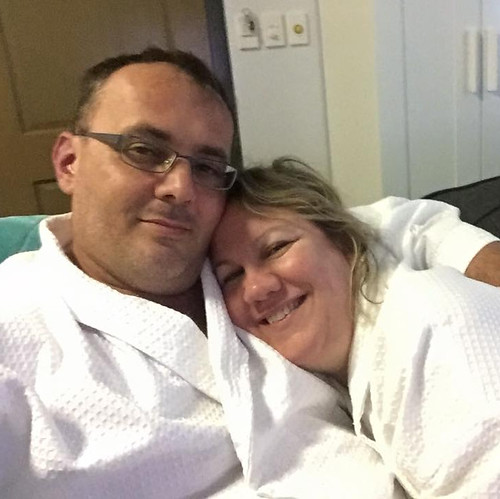I have a theory that undiagnosed or untreated depression in one (or both) partners, is behind the breakup of many marriages.
Let me explain.
Although I’m not a marriage counsellor or therapist, I’ve drawn this conclusion based not only on my own experiences (living with chronic depression, and married for over 28 years) but also on my observations of others.

And I have long thought, if only more people realised – how many marriages or relationships could be saved?!
My hope in writing this article is that anybody contemplating ending their relationship, will not only stop and ask themselves: “Have I fallen out of love or am I depressed?” – but also seek the professional opinion of their GP and/or a psychologist.
Because the sad fact is that depression skews our thinking and feelings to such a degree, that you fail to realise what you’ve got until it’s too late. It can make you feel like the love is gone from your life and/or your relationship for good.
Why Do I Care?
I think we can all agree that the ending of any intimate relationship, but particularly a marriage, causes major upheaval in each partner’s life. Often, there are children (or fur babies!) involved as well. Separation can prove very expensive once lawyers get involved, and it can seem to drag on and on unless you choose to go for private family mediation.
It can be a long and painful process, and many people find themselves in a worse situation for years after the divorce or separation, than they were before – financially, socially and psychologically. One article I found stated that approximately half of all divorcees regret breaking up with their partner!
If asking one simple question could start a couple on the path to saving their marriage, and avoiding all this heartache and devastation – then why wouldn’t you?!
How Depression Affected my Marriage
I know what it’s like to live with undiagnosed and untreated depression.
I was officially diagnosed a couple of years after my second child was born, but in hindsight it had held me in its grip for quite a long time before that.
I can remember holding our firstborn at his christening, and looking at my husband and thinking: “You know what? I don’t even like you very much!” Maybe it was just the post pregnancy hormones – or maybe depression was already rearing its ugly head in my life.

It seems such a shocking thought to me now, and I can’t even imagine ever feeling like that – but at the time, it was true. Thankfully my story has a happy ending, as we are still together and our relationship is stronger than ever.
But from that time until I was diagnosed with depression over four years later, our relationship suffered. My poor husband couldn’t do anything right as far as I was concerned – and he seemed to get upset about every second thing I said. My whole outlook was so negative that it spewed forth into my conversation – no wonder he got upset – I was horrible!
And yet – I blamed him for all our problems when in reality, my negativity, anger and extreme irritability (all common signs of depression), were the cause.
Had I fallen out of love with my husband? I’m reluctant to say it went that far. The ebb and flow of “passion” and “romance” is a normal part of any long term relationship – it would be impossible to live for any extended period of time with all the heightened feelings that you feel in the early days! But it was certainly a time when we struggled.

However, once I started treatment for depression, one of the first things I noticed was my wonderful husband. It was like I fell in love, all over again – which I think you can see in the pic above which was taken on our 10th wedding anniversary.
The Prevalence of Depression
When you add the statistics on depression and how it impacts every area of our lives – affecting our wellbeing, personal relationships, career and productivity – to my own experiences and observations, my theory starts to make a lot more sense. According to the Beyond Blue website:
- nearly 3 million Australians live with depression and/or anxiety;
- only 35% of these will access treatment;
- one in six will experience depression at some stage in their lives – one in five women (lucky us), and one in eight men;
- blame those darn hormones – depression affects up to one in ten pregnant women, and one in seven in the first year after the birth.
It seems I’m not the only one that has drawn this conclusion. Psychiatrist Peter Kramer has noted that when working with clients who are dissatisfied with their relationships and thinking of ending them, he always suspects depression or another mood disorder! (1)
I write all this, and share my own personal story, as a plea from the heart. I could so easily have given up on my marriage all those years ago, and lived to regret it.

Before walking away from your marriage or relationship (or letting a loved one do so) – please, PLEASE, see a GP or a psychologist, before taking such a dramatic step.
I’m not saying that this is the case for every marriage, or even that every marriage is worth saving. But it’s worth considering.
Because wouldn’t you hate to lose what could be a great marriage once more, simply because one of you has depression, a condition which responds well to treatment?
What’s your thoughts? Do you think depression is a factor in a lot of marriage breakdowns, like I do?

Wow, this resonated with me so strongly. My marriage fell apart last year due to various reasons, most of which stemmed from my depression, anxiety and low self-esteem. It’s interesting to note that I did go to my GP first and I was not given antidepressants until after my marriage ended. It was classed as ‘situational depression’ and I can totally see that my marriage break up affected me considerably, but it’s interesting to think that things may have been done more amicably if I wasn’t so negative, anxious and irritable.
In saying that, I now have a new partner and I can honestly say I am in a 100% better place than I was this time last year. The depression was definitely a hindrance in my relationship and the anxiety still rears its ugly head a lot in this new relationship as it is all uncharted territory for me, but in the end it also came down to the incompatibility of my previous relationship.
It’s hard to sum up ten years of change and growth in a blog post comment- I don’t regret leaving my marriage but I do have a lot of feelings of guilt about the impact it has had on my children. Divorce and marriage breakups are never what you plan when you’re in love with somebody, and I would be really interested to hear more feedback about the link between depression and divorce.
Hi Lauren, thanks for stopping by and commenting.
I’ve added a sentence near the end of this post after you read it, to say “I’m not saying that this is the case for every marriage, or even that every marriage is worth saving. But it’s worth considering.” I definitely don’t want to make anybody feel guilty for ending a relationship, or not recognising that depression was a key factor in the breakup – because there are many many reasons why relationships don’t work out.
Oh, and I did a quick Google search about “the link between depression and divorce” and it seems the experts agree that depression can be a major disruptor of marriages, though more research is needed.
I’m also really glad that you’re 100% happier now!!!!
I’m sure there is a correlation but causation would still need to be proven. (Proved? I hate that choice of words haha.)
What I don’t like are doctors who go to one topic/condition as their favorite to rule out an issue. It’s biased diagnostic “skills” like that which make our lives hard in managing Ben’s conditions, doctors need to look at the evidence first, not their pet condition.
You’re right Vanessa, a lot more research needs to be done.
There are many reasons why I don’t like doctors in general! It’s hard to find a good one isn’t it.
My husband has chronic long term depression – which has taken a toll on our marriage at various stages too. Stage 1 was before he was diagnosed (nobody seemed to be aware of Seratonin deficiency etc back then) Stage 2 was the first time he stopped taking his low dose maintence meds – because “he didn’t need them” and Stage 3 was when he stopped a second time. I’ve now told him there wil be no Stage 4 because I’ll walk out the door.
Seriously, the withdrawal and lack of emotion that goes with depression is very hard on the spouse – women personalize things and I’d always think it was me – and then we’d finally realize it was him and he’d swing back up again with meds (and I become less irritating apparently!)
So, yes you are absolutely right – a lot of marriages are impacted by undiagnosed, or under-medicated depression. I’m glad our’s survived and is still going strong – but depression SUCKS – for everyone in the family! Glad your’s survived too x
So good to hear from you about the OTHER side. I’m sure my hubby would agree with everything you’ve said above, and that’s part of the reason I stay on medication even after 20 years (have tried to go off it but it wasn’t a good idea) – because my family deserves better!
I think more research needs to be done with this Janet. You’ve raised some great points from your research and even from your own personal experience. Thank you for sharing your story and being honest. I hope it does help others who may be experiencing difficulties in their marriage.
Hi Bec, I’ve actually had a private message from a reader that she is now seeking help for her depression, and sticking with her marriage. It doesn’t get much better than that! x